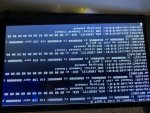SoConfused1337
Cadet
- Joined
- May 7, 2020
- Messages
- 7
Hi all, I'm new to FreeNAS and I'm starting to get extremely frustrated. On the recommendation of a friend I chose to build a new NAS this way instead of purchasing a new symbology and I'm starting to regret it.... Hopefully you can help.
I bought the following
Fractal Node 804 case
Gigabyte H370 motherboard
LSI 9215 SAS controller flashed to IT MoDE
Intel I3-8100
8 6TB WD Reds
2 2TB Samsung SSDs
Corsair AX860 PS
Everything went together great and started fine
But when I went to create one z2 pool with the 2 cache drives is where everything started going wrong.
I couldn't do it.
All I could get is the 4 WDs connected to one breakout cable and the 2 SSDs on the board into one pool.... The other 4 that are all attached to a single breakout cable and plugged into a single bank in the LSI card still won't work. I thought maybe it was a bad cable so I swapped it out, I thought it was a bad card so I swapped it out, still nothing.
Each time it's the same thing. If all drives are showing in the UI, when I go to extend the pool to the other 4 drives my screen just goea into a loading screen and I get the errors that show up in the screenshot.
The drives plugin individually fine, so what could I be missing or what is it I'm doing wrong.
Any Advise would be greatly appreciated.
I bought the following
Fractal Node 804 case
Gigabyte H370 motherboard
LSI 9215 SAS controller flashed to IT MoDE
Intel I3-8100
8 6TB WD Reds
2 2TB Samsung SSDs
Corsair AX860 PS
Everything went together great and started fine
But when I went to create one z2 pool with the 2 cache drives is where everything started going wrong.
I couldn't do it.
All I could get is the 4 WDs connected to one breakout cable and the 2 SSDs on the board into one pool.... The other 4 that are all attached to a single breakout cable and plugged into a single bank in the LSI card still won't work. I thought maybe it was a bad cable so I swapped it out, I thought it was a bad card so I swapped it out, still nothing.
Each time it's the same thing. If all drives are showing in the UI, when I go to extend the pool to the other 4 drives my screen just goea into a loading screen and I get the errors that show up in the screenshot.
The drives plugin individually fine, so what could I be missing or what is it I'm doing wrong.
Any Advise would be greatly appreciated.

